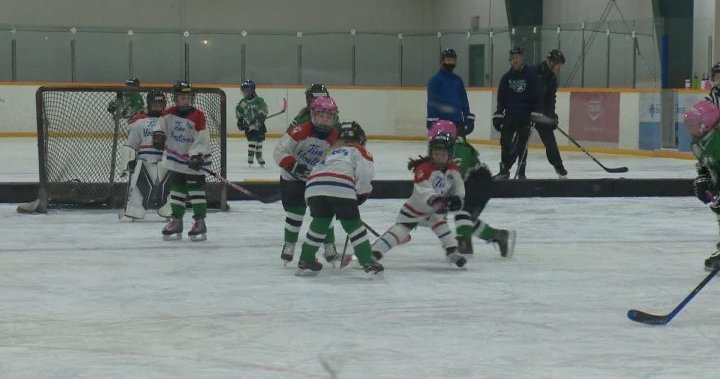All hockey leagues in Canada should raise the age when bodychecking is allowed, the Canadian Paediatric Society is urging in a new research paper.
The recommendation was made Wednesday in a report authored by University of Ottawa professor Dr. Kristian Goulet, citing studies that link bodychecking to concussions and the brutal effects of the injury.
Hockey organizations and competitive hockey leagues must implement new policies and rules to prevent bodychecking before players are 15-years-old, pediatricians Dr. Kristian Goulet and Dr. Suzanne Beno wrote in a joint statement.
“By eliminating the bodychecking altogether up until 15, we can do huge, huge favours for our to our kids,” Dr. Goulet told Global News Thursday. “Both from their neurologic health in terms of concussion, but also we know concussions affect mental health.”
Hockey Canada, which governs the sport, currently bans checking in leagues with players younger than 13, for women’s and girls’ leagues, and in any other division that a member association approves.
Drawing on other research, the paper states concussions count for 80-90 per cent of traumatic brain injuries, that 200,000 concussions occur every year in Canada mostly among children and youth and that hockey was the leading cause of traumatic brain injuries in all sports across all youth age groups in the country.

Other studies cited in the paper show injury rates are about 50 per cent lower in youth leagues without bodychecking.
One 2017 study published in the British Journal of Sports Medicine claims that eliminating bodychecking would decrease concussion rates across the entire country between 20 to 90 per cent.
Concussion symptoms range from nausea and vomiting, difficulties remembering and emotional instability. Most children and youth recover from concussions within four weeks, but others can suffer longer.
The Paediatric Society’s new paper also warns of the connection between concussions and Chronic Traumatic Encephalopathy (CTE), a brain disease that is often fatal.
Goulet, a University of Ottawa professor and pediatrician, also said concussion effects are cumulative.
When asked by Global News if it would consider changing its policies in light of the call from the Canadian Paediatric Society, Hockey Canada pointed to its move to recently remove bodychecking for U13, but didn’t say whether it would make the recommended changes to ban the practice until the age of 15.

It also said it is committed to “providing safe and positive experiences” and that it is engaged with its key stakeholders “to make the game safer for our participants.”
Goulet said the organization made the right choice 10 years ago and should listen to the science to do it again.
He stressed he’s not trying to change the game. He said he grew up playing hockey – that his dad was a coach – and that sports are very important for children, and the benefits outweigh the potential risks.
But teaching young players how to check and protect themselves in practice would avoid many injuries, especially those caused by big, open-ice hits and elbows to the head among players that can be 60 lbs (about 30 kilograms) heavier than one another.
The sooner Hockey Canada acts, he said, the more injuries can be prevented.
“These kids, they’re going to put food on the table (later in life) with what’s between their ears. And we’ve got to make sure we can protect that.”
© 2023 Global News, a division of Corus Entertainment Inc.




